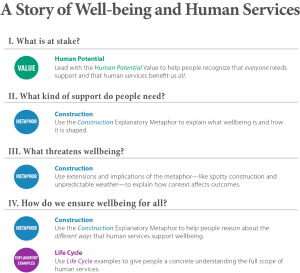Begin at the Beginning: The Public’s Take on Human Services
January 10, 2019With a new year upon us, we thought it would be useful to revisit the origins of reframing by taking a close look at the FrameWorks Institute MessageMemo, “Talking Human Services,” that is the research-based foundation for the National Reframing Initiative’s work. We frequently refer readers to “Talking Human Services,” and so in this issue are providing key takeaways about how the public thinks about human services that can guide your use of this meaty resource.
Understanding Americans’ Views
We all rely on “cultural models,” which are shared understandings or patterns of thinking, to help us process and make sense of new information. Cultural models allow us to be quick and efficient thinkers, but can backfire when they are based on incomplete and erroneous perceptions.
In order to see what the public thinks about human services, FrameWorks first looked at how the public defines and understands well-being. FrameWorks identified the following limited cultural models that Americans use in considering well-being—which run counter to experts’ knowledge—and, in turn, restrict how they think about how human services can cultivate it:
- Well-being is financial self-sufficiency and physical health. The public’s readily-available understanding excludes essential aspects of well-being, like mental health and social connections, which leads the public to think of a narrow set of strategies for fostering well-being.
- Well-being is threatened by a lack of individual will power, bad parents, and dangerous communities. This line of thinking makes it harder to see how the broader societal context, policies, and institutions influence well-being and rules out possible social solutions.
- Individuals themselves are responsible for improving well-being. Americans believe that individuals should have the drive and determination to improve their own lives and are skeptical of the government’s ability to play a productive role in supporting well-being. Both concepts decrease support for collective solutions.
- Human services is an unfamiliar term. As a result, people default to understandings of it as direct and temporary services to address basic needs for people in crisis, which create further misunderstandings of dependency and exclude prevention, advocacy, and the many other ways that human services support well-being throughout life.
As FrameWorks explains in this video, understanding these cultural models allows “communicators [to] anticipate what their messages must overcome, proactively maneuver around unproductive understandings, and intentionally activate more productive ways of thinking.”
Shifting the Public’s Thinking
FrameWorks tested different ways to tell the human service story and found that the Building Well-Being Narrative significantly increased the public’s understanding of what human services are and why they are critical to creating thriving communities. The Building Well-Being Narrative replaces the public’s default views about human services with a more accurate model.
As we’ve discussed before, the most effective way to use the Building Well-Being Narrative to generate understanding and support is to apply the recommended values, metaphors, and examples to your communications by:
- Opening with an appeal to the value (i.e., belief that drives attitudes) of Human Potential that describes what is at stake and resonates with the public—“Our communities are stronger when all people can realize their full potential.”
- Expanding the frame for human services by using the Explanatory Metaphor of Constructing Well-Being to connect it to a concrete, familiar example that explains what well-being is and how it’s created with human services, as well as what can threaten it to connect context with outcomes.
- Reframing the assumption that human services should be temporary by drawing on Explanatory Examples that come from across the Life Cycle to illustrate and spur engagement by explaining and normalizing how human services support well-being throughout people’s lives.

SPOTLIGHT ON
The National Reframing Initiative’s local New York partner, Human Services Council (HSC), released a new video, “Everyone Deserves a Fair Slice!,” asking “What if pizza shops were funded like nonprofits?” The video compares how prescriptive, inadequate, and unpredictable funding would affect a small business as a way of illustrating how those same limitations impact how community human service organizations operate. Premiering at HSC’s Changemakers of New York December benefit where about 300 attendees viewed it, it’s spreading on HSC’s social media networks and has been covered by New York Nonprofit Media and The Nonprofit Quarterly.

